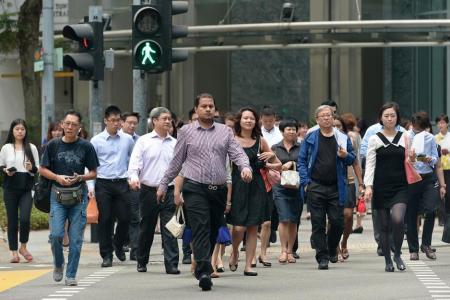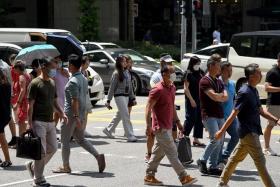Foreign employment down by 32,000
Decline in number of foreign workers here is the biggest drop in 15 years
The number of foreigners working in Singapore fell by 32,000 last year - the biggest drop in 15 years - even as more locals were hired.
While the decline was mostly due to fewer work permit holders in the construction and marine shipyard industries, the number of skilled foreigners on employment passes (EP) also went down by 4,500.
This was the first drop in at least six years, according to latest figures released by the Ministry of Manpower (MOM) yesterday.
Industries that hired fewer EP-holders include the professional services and infocomm technology sectors. In tandem, they employed more locals, said the ministry in its report. It did not give the breakdown.
The last time Singapore saw such a steep decline in the number of foreigners working here was in 2002, when it plunged by 43,000. That year, the republic was facing an economic slowdown in the wake of the Sept 11 terrorist attacks in 2001.
This time, weaknesses in both the construction and marine shipyard industries played a key role, said the MOM.
But observers noted some success in the Government's effort to build a so-called "Singapore core" in the workforce - by tightening foreign manpower policies and upgrading the skills of local workers.
Overall, 21,300 more Singaporeans and permanent residents were in jobs last year than in 2016. As a result, they made up a slightly bigger share of the workforce - at 67.2 per cent, up from 66.4 per cent.
The workforce, excluding maids, stood at 3.42 million in December.
The shifting composition follows a tightening of foreigner hiring rules in recent years.
To cope, businesses are turning more to locals, said Singapore National Employers Federation's executive director Koh Juan Kiat.
Recruiters such as ManpowerGroup Singapore and Adecco Singapore also said they see some companies opting to train their existing workforce instead of hiring new foreign manpower to fill the skills gaps.
But some employers said they could not find locals to fill certain roles, such as in high-tech areas.
In response, MOM said last week it exercises flexibility in assessing EP applications from firms that, among other conditions, plan to develop such skills among locals.
The development comes against a backdrop of improving job prospects for locals.
MOM said local employment is likely to continue to grow this year, in line with expected economic growth of between 1.5 per cent and 3.5 per cent.
But the opportunities will likely be uneven, with more hiring in sectors such as manufacturing, infocomms and media, logistics and wholesale trade, it said.
It called on employers to "focus on upgrading jobs and wages through better productivity and job redesign, in order to attract higher-skilled and younger locals" as more older rank-and-file workers will be retiring .
FOR MORE, READ THE STRAITS TIMES TODAY
Get The New Paper on your phone with the free TNP app. Download from the Apple App Store or Google Play Store now



